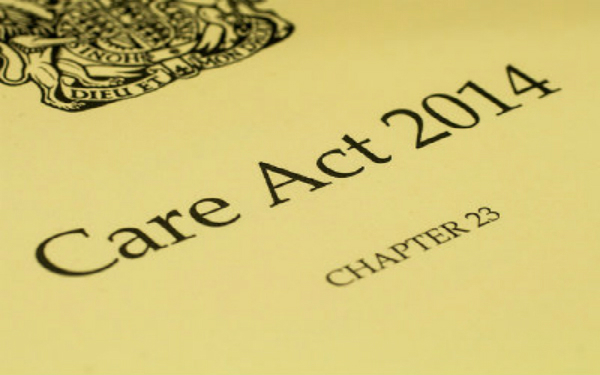Safeguarding adults enquiries: do you need consent?

By James Codling
With a worrying frequency, I am hearing in training sessions, and in practice across the country, the following statements:
- “We require the person’s consent before we undertake a safeguarding adults enquiry.”
- “Have we assessed [insert name]’s capacity to consent to the safeguarding enquiry?”
Neither of these are in line with the Care Act 2014 or the Mental Capacity Act 2005 (MCA) and both should be removed from training and practice immediately. In this short article, I hope to explain why this is the case.
What section 42 says
Section 42 of the Care Act 2014 sets out local authorities’ duty to make safeguarding enquiries:
(1) This section applies where a local authority has reasonable cause to suspect that an adult in its area (whether or not ordinarily resident there) –(a) has needs for care and support (whether or not the authority is meeting any of those needs),
(b) is experiencing, or is at risk of, abuse or neglect, and
(c) as a result of those needs is unable to protect himself or herself against the abuse or neglect or the risk of it.
(2) The local authority must make (or cause to be made) whatever enquiries it thinks necessary to enable it to decide whether any action should be taken in the adult’s case (whether under this Part or otherwise) and, if so, what and by whom.

Photo: Gary Brigden
No requirement for consent
At no point is section 42 saying that an enquiry may only be undertaken with the person’s consent or, if the person lacks capacity to consent, if it is seen to be in their best interests.
The word to focus on in section 42 is ‘must’.
Where the requirements of section 42 (1) are met, the local authority ‘must make (or cause to be made) whatever enquiries it thinks necessary to enable it to decide whether any action should be taken in the adult’s case (whether under this Part or otherwise) and, if so, what and by whom’ (section 42(2)).
So why is there confusion?
The key misinterpretation that I see is confusing:
- trying to involve a person in a process, with
- carrying out an act that requires a person’s consent/permission before you carry it out.
So, if we start with involving the person in the safeguarding adults enquiry, the Care and support statutory guidance states clearly, at paragraph 14.80, that:
“The adult should always be involved from the beginning of the enquiry unless there are exceptional circumstances that would increase the risk of abuse. If the adult has substantial difficulty in being involved, and where there is no one appropriate to support them, then the local authority must arrange for an independent advocate to represent them for the purpose of facilitating their involvement.”
Involvement is not consent
As you see from this quote, involving the person in the safeguarding adults enquiry is not the same as requiring the person’s consent to undertake the enquiry.
This is because local authorities ‘must’ undertake a safeguarding enquiry where the requirements of section 42(1) of the Care Act are met.
We do not require the person’s consent, but we do, of course, want to do everything we can to involve the person in the process.
When consent and the MCA may be relevant in safeguarding cases
I am not saying that consent and the Mental Capacity Act are not relevant to the safeguarding adults process.
It is just that it is not relevant to the question of whether or not a safeguarding adults enquiry is undertaken by a local authority.
My summary below may help you think this through in practice.
Facilitating involvement
Whilst we do not require the person’s consent to undertake the enquiry, we must take steps to facilitate the person’s involvement at the beginning of the enquiry and throughout the safeguarding adults process (Care and support statutory guidance, 14.80).
The person may require the support of an appropriate person, such as a relative, or, if unavailable, an independent advocate, because it appears that the person would have ‘substantial difficulty’ in ‘being involved’ (see safeguarding enquiries and reviews, section 68 of the Care Act 2014).

Photo: Feng Yu/Adobe Stock
In such cases, a person may not be regarded as ‘appropriate’ unless the adult consents to being represented by them or, where they lack capacity to consent, “the local authority is satisfied that being represented and supported by that person would be in the adult’s best interests” (section 68 (5)).
Asking about outcomes
As part of the enquiry, we should take steps to find out what outcomes the person would like to achieve, in line with the principle of empowerment set out in the Care and support statutory guidance at paragraph 14.13:
“I am asked what I want as the outcomes from the safeguarding process and these directly inform what happens.”
Again, this is not a consent/capacity question as, at this stage, no ‘act’ is being carried out for which we require the person’s consent.
This is about gathering the person’s views and wishes, which either the person can do independently or, if not, would be achieved with the support of an appropriate person or an independent advocate. So, it is still about facilitating involvement in the enquiry.
Taking action as a result of an enquiry
The final stage of the process is where an action is being taken as a result of the section 42 enquiry.
The statutory guidance states at 14.79:
“What happens as a result of an enquiry should reflect the adult‘s wishes wherever possible, as stated by them or by their representative or advocate. If they lack capacity it should be in their best interests if they are not able to make the decision, and be proportionate to the level of concern.”
Actions that do not require consent
However, there might be some actions taken as a result of a safeguarding adults enquiry for which we do not require a person’s consent and the Mental Capacity Act would also not apply.
This is by no means an exhaustive list but examples include the police investigating the abuse of a person or the local authority or Care Quality Commission taking contractual/regulatory action against an organisation.
Where consent should be considered
In other cases, we would need to consider whether the person has consented, for example, when asking the person if they would like to change care setting or agency or have support with financial management, managing their online safety or limiting their contact with another person.

Photo: STOATPHOTO/Adobe Stock
Should the person refuse any action being taken, it would be helpful to reflect on this very important section from 39 Essex Chambers’ Mental Capacity Guidance Note: Assessment and Recording of Capacity: ‘…If you have proper reason to think that the person may lack capacity to take a relevant decision, especially if the consequence of what they are wanting to do is likely to lead to serious consequences for them, it would be simply inadequate for you simply to record (for instance) “as there is a presumption of capacity, [X] decision was the person’s choice.” Indeed, the more serious the issue, the more one should document the risks that have been discussed with P and the reasons why it is considered that P is able and willing to take those risks.’
Should there be a reason to doubt the person’s capacity to make the relevant decision about the action being taken, then the Mental Capacity Act would apply.
Consent issues beyond the MCA
We should also consider whether there may be issues around a person’s decision making that sit outside the Mental Capacity Act.
One example might be where there is coercion or undue influence that limits a person’s ability to make decisions for themselves, but the MCA test isn’t met, ie they are not unable to make the decision because of a mental impairment/disturbance.
In these situations, you may need to call on the inherent jurisdiction of the High Court, through which it can make declarations and orders to protect adults who have mental capacity to make relevant decisions, but are vulnerable and at risk from the actions or inactions of other people (see 39 Essex Chambers’ Mental Capacity Guidance Note – Inherent Jurisdiction for further guidance).
A mindset of empowerment
I hope that this article has given frontline practitioners, safeguarding adult leads, MCA leads and principal social workers some food for thought on this topic.

Photo posed by models: Kurhan/AdobeStock
I would also hope that by adopting a mindset of involvement, empowerment, and engagement, rather than an illusory – and sometimes ‘tick box’ – requirement to obtain the person’s consent to the enquiry, our approach will be much more person-centred.
It is also vitally important that all local authorities develop accessible resources for the people that they support that explains their rights and our responsibilities, in line with the Care and support statutory guidance‘s principle of accountability:
“I understand the role of everyone involved in my life and so do they.”
For anyone interested in furthering their learning in this area, the webinar ‘An Introduction to Safeguarding Adults with Katie Scott and Nyasha Weinberg’, which is part of 39 Essex Chambers’ The Public Law Podcast series, is a perfect place to start.
James Codling is Mental Capacity Act and Deprivation and Liberty Safeguards training and development manager at Cambridgeshire County Council